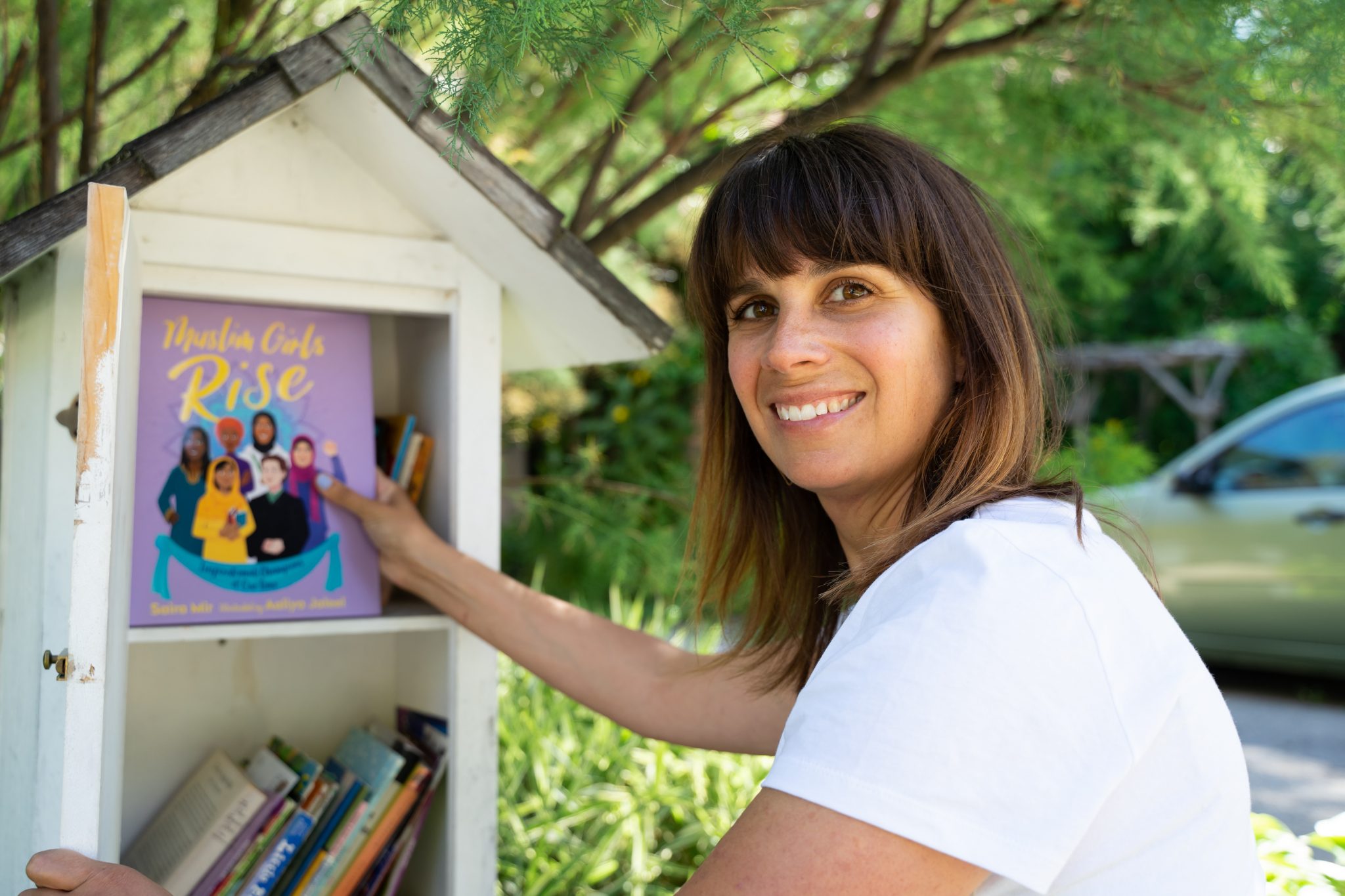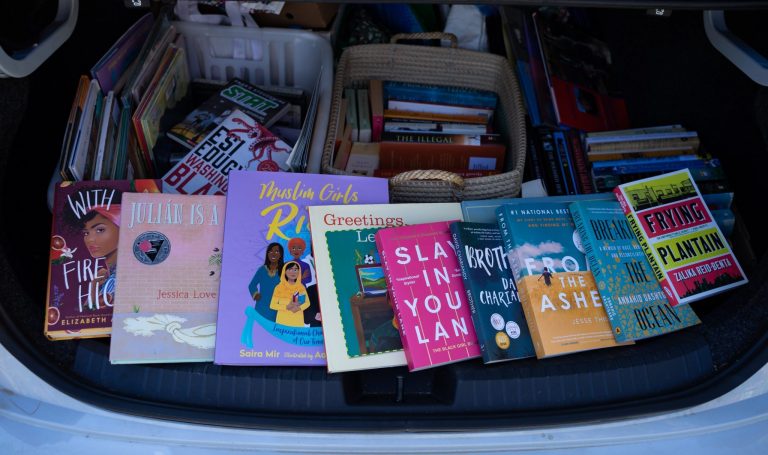In June, Sarah Kamya, a New York high-school counsellor, was walking around her hometown of Arlington, M.A. and noticed that the books in the little free libraries were predominantly stories about white characters written by white authors.
In an effort to “amplify and empower Black voices,” and “fight racism” according to her Instagram page, Kamya began filling her local little libraries with diverse books through her Little Free Diverse Libraries project. Since then Kamya has shipped hundreds of books to little libraries across the U.S.
In KW, Dinah Murdoch, an early literacy intervention resource teacher with the Waterloo Region District School Board has been teaching struggling young readers to get on the path to literacy, as well as educating teachers all over the Region.
After seeing the work that Kamya was doing, Murdoch looked through our own local KW little free libraries and noticed that they were lacking diverse content. She decided to take action in our own backyard and launched KW Little Free Diverse Libraries — providing fiction and non-fiction books by Black and Indigenous authors for kids and adults in our community.

“I just thought well, that’s such an easy way to take action and I can do that here and that’s totally doable. So when I first started it, within a couple of weeks I reached out to Sarah Kamya and said I’d like to do this in my community,” Murdoch said.
Murdoch gives the creator Kamya credit, and is really clear on her social media and website that it was Kamya’s idea and vision, and that KW’s local chapter is an outpost of the main project along with many satellite outposts all over Canada and the US taking part — a sort of underground railroad of diverse books.
Since the Black Lives Matter movement and anti-racism messaging became more prominent, Murdoch realized that issues with systematic racism and oppression were occurring in our own community, and that educating the public with this project was the best way to combat it.
“It’s not white supremacists, it’s white progressives who think that we’re not racist and think that ‘I would never say that or do that, and I have Black friends, and I want to help people,’ but we are also upholding systems that are racist,” Murdoch said.
One of the books Murdoch believes is important to circulate to the white community is author Robin DiAngelo’s White Fragility — a term coined by the author “to describe the disbelieving defensiveness that white people exhibit when their ideas about race and racism are challenged,” according to sociologist Katy Waldman in an article for the New Yorker.
Murdoch wants to stress the importance of books that educate and tell stories about the experience of Black and Indigenous people, as well as how integral it is to show representation to kids through the characters.
“It’s so important for kids to have access to books where they see themselves. It’s also great for a book to have a Black character that’s not about being Black — a character that goes to the doctor, and the doctor is Black, or a family having dinner together and they just happen to be black.” Murdoch said.
“Sometimes those books are written by white authors, and that’s ok too, but for the most part, when creating this [book] list, I tried to really vet as much as possible, and keep it to mostly Black and Indigenous and POC.”
Books that allow readers to experience and enjoy both “mirror” books — where readers can see their own experiences and culture reflected, and “window” books — where readers can learn about others’ lived experiences, are key according to Murdoch.
“I think we need to feel validated and read about what we are going through, but we also need to learn about others. That’s sort of what this project is rooted in — that need for both of those but from diverse places.”
All the books are labelled with a stamp or sticker to show that they are part of the project, and Murdoch urges readers to put the books back in the little free libraries once they have finished with them to keep them circulating.
“The label is an important piece, otherwise people don’t know. Even last night, I put some books in a little free library, and by the time I got home, the owner of the house had made a donation. So, that’s a great way to continue the word of mouth — with the labels.” Murdoch said.
At the time of the interview, Murdoch had raised just over 2 thousand dollars in individual donations, about 130 books had been purchased through the Indigo registry, and 50 plus books had been donated from people’s own collections.
Since early July when local media picked up the story, donations have slowed down according to Murdoch, but she hopes to keep the momentum going. Her goal is to put books in little free libraries all over KW.
“I want them in diverse neighbourhoods. If I truly am going to achieve that goal, I am going to have to look beyond individual donations and at Corporate donations. I’m looking for ways to take it to the next level in terms of getting financial donations.”
How to donate:
1 – Donating money through her website here.
2 – Ordering books on Indigo from the registry here. The books are then shipped to Murdoch to distribute to the little free libraries.
3 – Going through your book collections at home, or at local bookstores — Ensure the books you are donating are by Black, Indigenous or authors of Colour. Email Murdoch to arrange for pick-up or drop off.
Another main goal of the KW Little Free Diverse Libraries is to support independent Black and Indigenous-owned bookstores. 50 per cent of the money donated is spent locally in the Region, at bookstores like Words Worth Books in uptown Waterloo, and GoodMinds, a First Nations family-owned business, located on the Six Nations of the Grand River. The other 50 percent is spent at bookstores in the GTA and Southern Ontario.
Other than providing diverse books for adults and kids, the big question is how can we get kids in our community excited about reading? Murdoch explained that for kids, seeing the adults in their life reading — not just on a phone, but a real book — and being read to by the adults in their life, makes a difference. It’s also key to provide books that kids can get interested in.
“This project helps in that it puts books out there that are interesting, and where kids can be like ‘hey that kid looks like me, or the girl in the story is wearing a Hijab like my sister.’ Giving them access to quality books is big. It’s nice to be able to do that. Kids who are not enthusiastic about reading — if they see a kid on the cover who looks like them it could change that,” Murdoch said.
Go to KW Little Free Diverse Libraries’ Instagram page to see the ever-expanding booklist and get up-to-date addresses of which little libraries the books are being distributed to.

